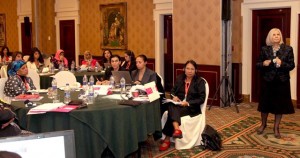Achievements in Women’s Rights at Stake amidst Regional Upheavals
Posted on: November 5, 2013, by : Editor
AMMAN — The advances achieved in safeguarding women’s rights over the past few years are at stake if no action is taken to protect them amidst regional uprisings, women activists said on Saturday.
Women’s rights activists participating in a regional training course and discussions on the “Role of Women in Peace and Security” stressed that women should be involved in shaping the future of their countries, especially those in transition.
The 100 activists who convened in Amman also pointed out that despite international resolutions designed to protect women from harassment in times of war, there were many violations during regional turbulence.
Hibaaq Osman, founder and CEO of the Karama organisation, said there were many issues before the revolutions and uprisings in the region, “but things got worse”.
In an interview with The Jordan Times on the sidelines of the event, Osman said women have taken on an incredible role in the uprisings.
“There are new opportunities… constitutions are being written, and new governments are coming to power,” she noted; thus, “it is important that women get politically engaged”.
Osman explained that every country in the Arab region has signed UN Security Council Resolution 1820 which ensures the protection of women in times of conflict.
The resolution, which was unanimously adopted on June 19, 2008, condemns the use of sexual violence as a tool of war, and declares that “rape and other forms of sexual violence can constitute war crimes, crimes against humanity or a constitutive act with respect to genocide”.
Stressing the need to abide by the resolution, Osman said: “We are hearing of women who are publicly raped, in addition to sexual harassment, because there are no strong central governments.”
However, despite the chaos, the rights activist said this situation can create an opportunity for women to make their voices heard.
Participants from countries that witnessed or are still witnessing turmoil agreed with Osman.
“Now, women’s issues are at stake, as the events taking place in the Arab region affected women’s rights,” said Mouna Ghanem, from the Syrian Women’s Forum for Peace.
“Women’s rights in Syria have been violated from both sides, the regime and the armed opposition,” Ghanem told The Jordan Times, adding that it was important for Syrian women to take part in such meetings, because Syria is heading towards the Geneva II meeting and “Geneva should give women enough space to express themselves.”
Even when the turmoil is over, women should secure a platform in the political transformation of their country, according to Salma Bu Gaighis, a Libyan activist and a member of the preparatory committee for the national dialogue in her country.
“I am worried about the future of women,” she said, speaking about Libya.
At the beginning of the Libyan revolution, “we thought women’s role would be very strong and effective” because the representation of women in the General National Council (GNC) was raised from 10 per cent to 16.2 per cent after lobbying for it, the activist said.
“… We have 34 women in the GNC now,” she noted.
However, “after that and because of the extremists and Islamist ideology, the role of women is going backwards”.
She noted that her country is currently in the process of writing the constitution, and only six of the 60 members appointed for this purpose are women.
The “Role of Women in Peace and Security” is hosted by Karama in partnership with the UN Fund for Gender Equality and the UNDP.
The four-day event, according to a Karama statement, is being held in response to the urgent and critical need to address women’s rights and roles in all stages of conflict, ensure their safety and protection under the law and mitigate consequences of gender-based violence.
The aim of the event is to develop the capacity of women’s rights activists and leaders to engage with UN Security Council Resolutions on women, peace and security.
Participants in the training course will be also equipped with the most effective advocacy techniques, which is important at a time of turmoil, according to Osman.
Chris Dougan, managing partner at Goddard Global, agreed with Osman, noting that campaigning is very crucial at this stage.
“We have to engage decision makers worldwide to focus the mindset of the international community on women’s rights in the region. But to do that, we need to focus on decision makers and we have to determine who to debate.”
This article originally appeared online at The Jordan Times on October 26, 2013.

